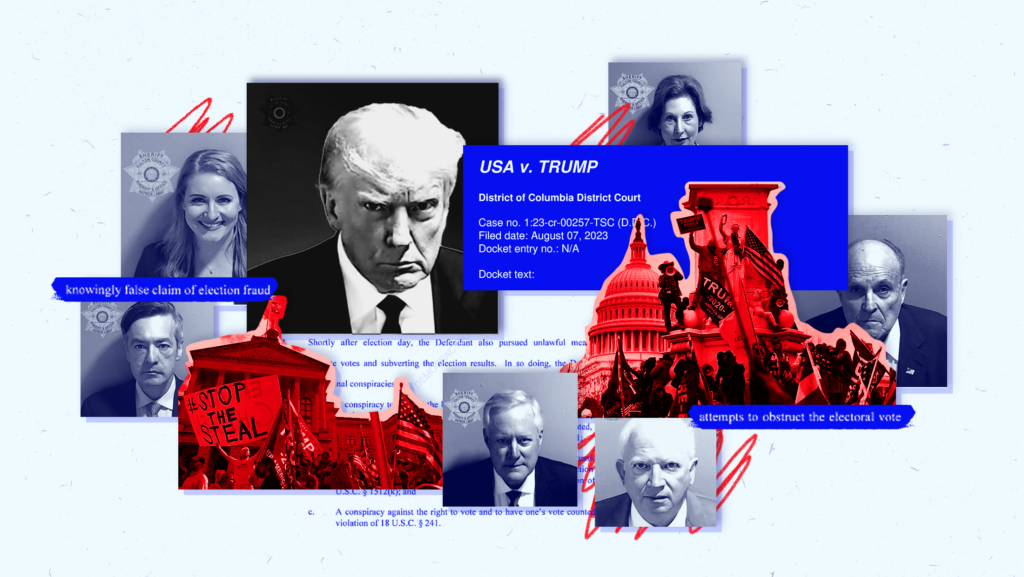These Indictments Are the Beginning, Not the End

When news broke earlier this month that a Georgia grand jury had indicted former President Donald Trump and his ring of co-conspirators — bringing Trump’s total charge count to 91 across four different criminal cases — some people barely batted an eye.
Despite charges including conspiracy to defraud the United States, conspiracy to obstruct justice, falsifying records and violating Georgia’s RICO Act, Trump and his supporters have seemed unbothered. Instead, they’ve enjoyed trolling fellow presidential candidate Gov. Ron DeSantis (R-Fla.) at the Iowa State Fair and worked to fundraise off of the indictments. It’s understandable that some Americans feel cynical about these indictments, questioning if our country can finally bring Trump to justice for his very public crimes when he is currently the leading Republican candidate for president of the United States. While this might just seem like the next thing in a long string of Trump’s antics, this moment is different.
These indictments do mean something, both for delivering justice to the American people for Jan. 6, for the families of the slain Capitol officers and for the future of our democracy. But handled incorrectly by the media, they can be turned into a benefit for those who have harmed our democracy the most.
The process will play out publicly over the course of a pivotal election year. If the lessons from 2016 go unlearned and news channels treat Trump as entertainment rather than a grave threat to civil society, his airtime will squeeze out any potential for alternative Republican candidates to gain name recognition or attention. Trump will inevitably try to fill the airwaves with his lies and prevent other candidates from getting their messages to voters.
Let’s be clear: election denialism is a threat to all of us, an attempt to ignore our voices at the ballot box and disenfranchise voters.
The media has a delicate responsibility to the public: balancing the need to refute lies by the former president against the importance of preventing him from dominating the narrative. The other task for the media is perhaps even harder: it must confront the reality that we no longer have two political parties grounded in equally good faith concern for the future of our democracy. The Republican Party officially declared the attack on the Capitol as “legitimate political discourse” and former Fox News host Tucker Carlson called the violent insurrectionists “sightseers.”
What happened on Jan. 6 was illegal and a violation of our democratic values, and everyone involved needs to answer for their role in the deadly insurrection, an event that continues to impact our institutions today. However, when the insurrectionist-in-chief and the architects of the insurrection at the highest level of government aren’t experiencing any accountability at all for their actions, insurrectionists feel more comfortable — and even empowered — to double down or reverse their pleas.
None of the elected officials who voted to overturn the election, spoke at the Stop the Steal rally or actively participated in the planning of the insurrection are experiencing any sort of accountability. They continue to chip away at the significance of that deadly day, wanting the American public to lose sight of the violence, hate, hypocrisy and bigotry they saw. The four indictments Trump is currently facing will offer the American people the opportunity to see that no one, including a president, is above the law and paint a full picture of his direct role in inciting and participating in the effort to overturn the 2020 election.
While Trump’s attempt to overturn the 2020 presidential election results was an attempt to impact a national election, it was just the beginning of election denialism in local politics. Candidates like failed Republican candidate Kari Lake refused to concede her bid for Arizona governor in 2022 and continued to spread conspiracy theories and dangerous disinformation about election integrity, allowing questions about voting and elections security to spread.
At least 222 insurrectionists were elected to public office in 2022. Recent Public Wise research found that although the vast majority of Americans have heard common election denier claims about voting and elections, there is no clear consensus among voters about what being an election denier means. Conservative voters say they are more likely to vote for a candidate labeled an election denier while a strong majority of self-identified moderate, liberal and progressive voters say they are less likely. Even up to 14% of progressive voters believe some election denier claims, suggesting that conspiracy claims and disinformation affect both parties. Let’s be clear: election denialism is a threat to all of us, an attempt to ignore our voices at the ballot box and disenfranchise voters.
The pursuit of justice doesn’t only matter because we’re heading into a pivotal election year. These indictments are a key part of our history. They will show the generations that follow what we did to fight for our democracy, to advocate for accountability and combat the hateful and powerful forces of white supremacy baked into every level of our government. They are a key step towards building a multiracial democracy that represents all of us. These indictments are for the people and by the people. These indictments are the beginning, not the end.
Christina Baal-Owens is the executive director of Public Wise.